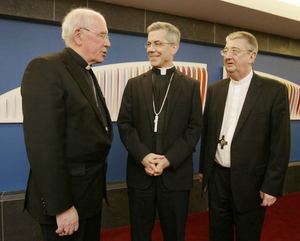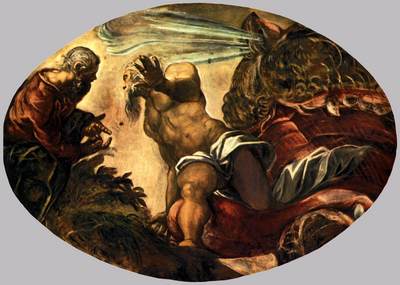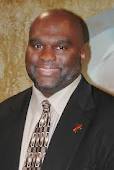 The Siena Forum for Faith and Culture (NYC) has been running a series on Marriage this year. The Year of Marriage began with Dr. Jim Healy from the Joliet Diocese and Deacon Harold Burke-Sivers of the Archdiocese of Portland was recently at the Siena Forum.
The Siena Forum for Faith and Culture (NYC) has been running a series on Marriage this year. The Year of Marriage began with Dr. Jim Healy from the Joliet Diocese and Deacon Harold Burke-Sivers of the Archdiocese of Portland was recently at the Siena Forum.January 2012 Archives
 The Siena Forum for Faith and Culture (NYC) has been running a series on Marriage this year. The Year of Marriage began with Dr. Jim Healy from the Joliet Diocese and Deacon Harold Burke-Sivers of the Archdiocese of Portland was recently at the Siena Forum.
The Siena Forum for Faith and Culture (NYC) has been running a series on Marriage this year. The Year of Marriage began with Dr. Jim Healy from the Joliet Diocese and Deacon Harold Burke-Sivers of the Archdiocese of Portland was recently at the Siena Forum.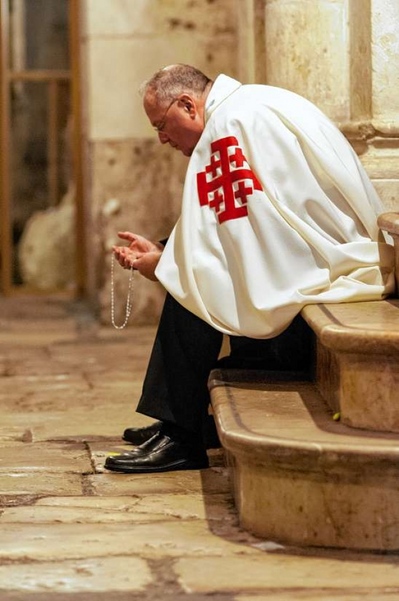
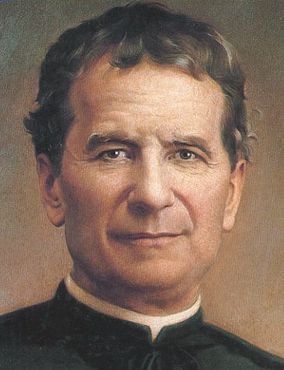 O God, who raised up the Priest Saint John Bosco as a father and teacher of the young, grant, we pray, that, aflame with the same fire of love, we may seek out souls and serve you alone.
O God, who raised up the Priest Saint John Bosco as a father and teacher of the young, grant, we pray, that, aflame with the same fire of love, we may seek out souls and serve you alone.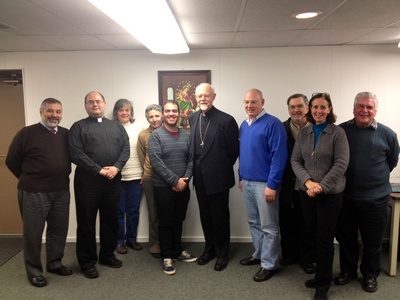 An annual Mass is celebrated for the repose of the soul of Father Luigi Giussani (+February 22, 2005) and the good of the Fraternity of Communion and Liberation. We are a small but faithful group of friends who help each other to follow Christ and love the Church; we live our Baptism.
An annual Mass is celebrated for the repose of the soul of Father Luigi Giussani (+February 22, 2005) and the good of the Fraternity of Communion and Liberation. We are a small but faithful group of friends who help each other to follow Christ and love the Church; we live our Baptism."Today, too, a new beginning is therefore necessary to testify to how reason and freedom find their fulfillment in faith, making evident that Christianity is something that is humanly worth our while. In this sense, the Year of Faith is directed first of all to Christians, but, in the degree to which we live a 'new beginning,' it can benefit everyone, according to the method chosen by Jesus: give the grace to some so that through them it can reach everyone who is open to accepting it."
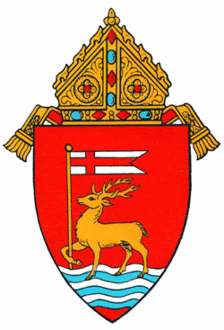 We cannot comply with this edict. Our parents and
grandparents did not come to these shores to help build America's cities and
towns, its infrastructure and institutions, its enterprise and culture, only to
have their posterity stripped of their God-given rights. In generations past,
the Church has always been able to count on the faithful to stand up and
protect her sacred rights and duties. We hope and trust that she can count
on this generation of Catholics to do the same. Our children and grandchildren
deserve nothing less.
We cannot comply with this edict. Our parents and
grandparents did not come to these shores to help build America's cities and
towns, its infrastructure and institutions, its enterprise and culture, only to
have their posterity stripped of their God-given rights. In generations past,
the Church has always been able to count on the faithful to stand up and
protect her sacred rights and duties. We hope and trust that she can count
on this generation of Catholics to do the same. Our children and grandchildren
deserve nothing less.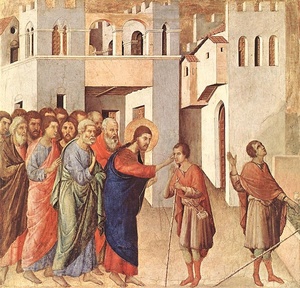
The full body of the Congregation for the Doctrine of the Faith met with the Pope on Friday, 27 January, to discuss his conviction that no other work of the Church, particularly this congregation, takes precedence to the work of evangelization. Everyone ought to be committed "to bringing God back into this world and to opening to all men access to the faith."
Benedict see now as the opportune moment "to point out to all the gift of faith in the Risen Christ, the clear teaching of the Second Vatican Council and the invaluable doctrinal synthesis offered by the Catechism of the Catholic Church." Recently, the Pope said that "we are facing a profound crisis of faith, a loss of religious meaning which constitutes the greatest challenge to the Church" (Message for World Mission Day).
Other things that concern us, the Pope noted were:
1. the unity among Christians: maintaining "coherence in the ecumenical task with the Second Vatican Council and the whole of Tradition";
2. warned of the dangers of "a shallow moralism";
3. to promote "the logic" contained in the conciliar teaching: "the sincere search for the full unity of all Christians is a dynamism animated by the Word of God";
4. a need for a "discernment between Tradition with a capital letter and the traditions": "There exists," he said, "a spiritual wealth in the different Christian confessions, which is an expression of the one faith and gift to share" (reflecting the recent work done for the full communion of Anglicans).
The last concern of Benedict was that the entire Church speak with one voice with Peter.
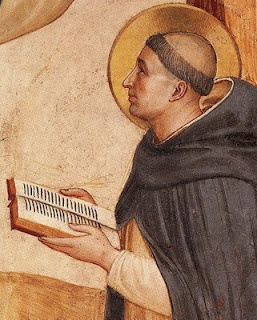 O God, who made Saint Thomas Aquinas outstanding in his zeal for holiness and his study of sacred doctrine, grant us, we pray, that we may understand what he taught one imitate what he accomplished.
O God, who made Saint Thomas Aquinas outstanding in his zeal for holiness and his study of sacred doctrine, grant us, we pray, that we may understand what he taught one imitate what he accomplished.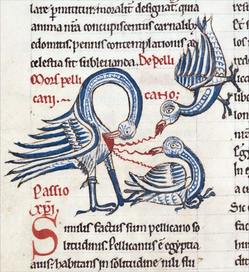
PELICANUS is the word for a certain breed of bird
Who truly is a crane;
Egypt is his domain.
There are two kinds there-of;
Near to the Nile they live;
One of them dwells in the flood, the fishes are his food;
The other lives in the isles on lizards, crocodiles,
Serpents and stinking creatures, and beasts of evil nature.
In Greek his title was Onocrotalos, which is longum rostrum,
Said in the Latin tongue instead,
Or long break in our own.
Of this bird it is known that when he comes to his young,
They being grown and strong,
And does them kindly things,
And covers them with his wings.
The little birds begin fiercely to peck at him;
They tear at him and try to blind their father's eye.
He falls upon them then and stays them with great pain,
Then goes away for a spell, leaving them where they fell.
On the third day he returns, and thereupon he mourns,
Feeling so strong a woe to see the small birds so
That he strikes his breast with his beak until the blood shall leak.
And when the coursing blood spatters his lifeless brood,
Such virtue does it have
That once again they live.
Know that this pelican signifies Mary's Son:
The little birds are men restored to life again by that dear blood
Shed for us by our God.
Now learn one morning more, revealed by holy lore:
Know why the small birds try to peck thie father's eye,
Who turns on them in wrath and puts them all to death.
Men who deny the light would blind God's blazing sight,
But on such people all His punishment will fall.
This is the meaning I find:
Now bear it well in mind.
-- from an Anglo-Norman Bestiary of 1120 by Philippe de Thaun;
this version from "Things of this World" by Richard Wilbur
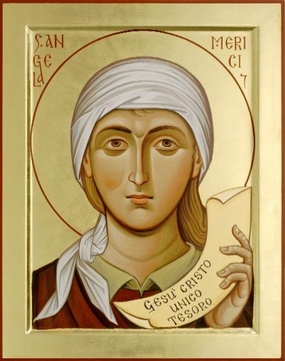
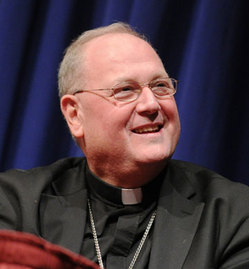
Fordham Law School's Institute on Religion, Law & Lawyer's Work hosted Archbishop Timothy Michael Dolan, PhD, for an inaugural address in the Law and the Gospel of Life series.
Sadly, it didn't make the news, well not much was said around the area about it. Fordham University published this brief press release read here. The crowd exceed initial expectations and a change of venue was made. Cardinal-designate Dolan centered his comments on Blessed John Paul II landmark encyclical, the Evangelium Vitae (1995). An excerpt of Dolan's remarks follows, below is the link to his entire text:
The Gospel of Life proposes an alternative vision of law and culture, one that provides an antidote to the pragmatic nihilism that produces a Culture of Death. It seeks to recapture the essential relationship between the civil law and the moral law, and to foster a culture in which all human life is valued and authentic human development is possible.
The Wall Street Journal published an op-ed piece of New York's Archbishop, Timothy Michael Dolan, today. You can read the entire op-ed piece of Archbishop Dolan here: WSJ-ObamaCare-and-Religious-Freedom.pdf
An excerpt follows:
Coercing religious ministries and citizens to pay directly for actions that violate their teaching is an unprecedented incursion into freedom of conscience. Organizations fear that this unjust rule will force them to take one horn or the other of an unacceptable dilemma: Stop serving people of all faiths in their ministries--so that they will fall under the narrow exemption--or stop providing health-care coverage to their own employees.
The Catholic Church defends religious liberty, including freedom of conscience, for everyone. The Amish do not carry health insurance. The government respects their principles. Christian Scientists want to heal by prayer alone, and the new health-care reform law respects that. Quakers and others object to killing even in wartime, and the government respects that principle for conscientious objectors. By its decision, the Obama administration has failed to show the same respect for the consciences of Catholics and others who object to treating pregnancy as a disease.
Timothy Michael Dolan, PhD
Archbishop of New York
Wall Street Journal
25 January 2012
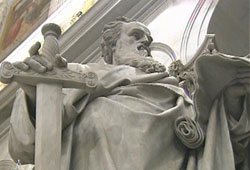
Dear brothers and sisters! It is with great joy that I extend my warm greetings to all of you who have gathered in this basilica for the liturgical Feast of the Conversion of St. Paul, concluding the Week of Prayer for Christian Unity, in this year when we are celebrating the fiftieth anniversary of the Second Vatican Council, that the Blessed John XXIII announced in this very basilica on January 25, 1959. The theme offered for our meditation in the Week of prayer which we conclude today, is: "All shall be changed by the victory of Jesus Christ our Lord" (cf. 1 Cor 15.51-58).
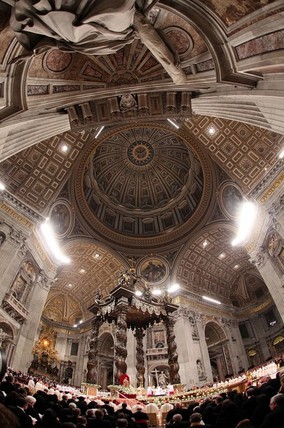
The Papal General Audience given in the Paul VI Hall today, Benedict spoke of the desire for unity that our Lord expressed in his priestly prayer at the Last Supper (John 17):
Against the backdrop of the Jewish feast of expiation Yom Kippur, Jesus, priest and victim, prays that the Father will glorify him in this, the hour of his sacrifice of reconciliation. He asks the Father to consecrate his disciples, setting them apart and sending them forth to continue his mission in the world. Christ also implores the gift of unity for all those who will believe in him through the preaching of the apostles.
Sacred Scripture and sacred Tradition and now echoed by Pope Benedict, believes that Christ's priestly prayer is understood as His instituting the Church, the community of faith, the communio found explicitly in a church that is one, holy, catholic and apostolic. Taking the Pauline manner of thinking, we are disciples of Christ who, through faith in Christ, are one and share in His saving mission:
In meditating upon the Lord's priestly prayer, let us ask the Father for the grace to grow in our baptismal consecration and to open our own prayers to the needs of our neighbors and the whole world. Let us also pray, as we have just done in the Week of Prayer for Christian Unity, for the gift of the visible unity of all Christ's followers, so that the world may believe in the Son and in the Father who sent him.
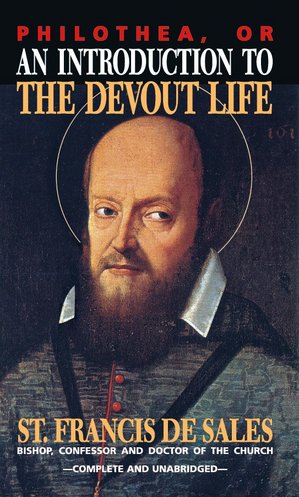
Good books are one thing. Books considered "classic," that is, those books that can withstand the test of time are not only an excellent resource but a true companion for one's journey. No doubt, our human and spiritual needs mature over time, but a classic continues to give insight and guidance. Wisdom collected from a true living experience is hard to underestimate. The Introduction to the Devout Life by Saint Francis de Sales, bishop and Doctor of the Church, is one such book. It is not to be missed by any person wanting to know the Christian life better, and how to live it coherently. The book is about the universal call to holiness.
The Introduction to the Devout Life was an instant success from the moment it rolled off the printing press. In the Saint's own time the book was revised a few times.
If you ask yourself: What do I need to do be better Christian? How do I live my life with all its complexities and remain faith to the Gospel and the Church? Do I have to be a priest, sister or brother to be a good Christian? How does one live a Christ-centered life? Then this book is for you.
"The writings of Francis de Sales, filled with celestial doctrine are a bright light in the Church, pointing out to souls an easy and safe way to arrive at the perfection of a Christian life" (Breviarium Romanum, 29 January, lect. VI).
Silence and Word: Path of Evangelization
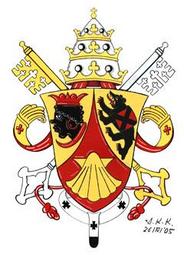
As we draw near to World Communications Day 2012, I would like to share with you some reflections concerning an aspect of the human process of communication which, despite its importance, is often overlooked and which, at the present time, it would seem especially necessary to recall. It concerns the relationship between silence and word: two aspects of communication which need to be kept in balance, to alternate and to be integrated with one another if authentic dialogue and deep closeness between people are to be achieved. When word and silence become mutually exclusive, communication breaks down, either because it gives rise to confusion or because, on the contrary, it creates an atmosphere of coldness; when they complement one another, however, communication acquires value and meaning.
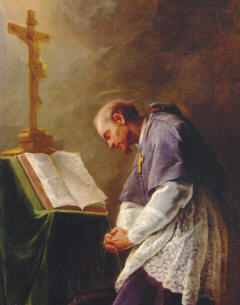 O God, who for the salvation of souls willed that the Bishop Saint Francis de Sales become all things to all, graciously grant that, following his example, we may always display the gentleness of charity in the service of our neighbor.
O God, who for the salvation of souls willed that the Bishop Saint Francis de Sales become all things to all, graciously grant that, following his example, we may always display the gentleness of charity in the service of our neighbor.Day of Penance and Prayer to be observed on January 23rd this year.
In November, 2001, the United States Conference of Catholic Bishops approved the adaptation of the General Instruction of the Roman Missal. Following confirmation by the Holy See in February, 2002, the following became particular law for the dioceses of the United States of America:
In all the dioceses of the United States of America, January 22 (or January 23, when the 22nd falls on a Sunday) shall be observed as a particular day of penance for violations to the dignity of the human person committed through acts of abortion, and of prayer for the full restoration of the legal guarantee of the right to life. The Mass "For Peace and Justice" (no. 21 from "Masses for Various Needs") should be celebrated with violet vestments as an appropriate liturgical observance for this day.
On January 22, 2003, a "day of penance for violations to the dignity of the human person committed through acts of abortion, and of prayer for the full restoration of the legal guarantee of the right to life" will be mandatory in the dioceses of the U.S. for the first time. As an "Optional Memorial," the Mass celebrated that day may be the Mass "For Peace and Justice" or follow the normal weekday Mass readings and prayers for the day found in the Ordo, with or without optional prayers related to St. Vincent of Saragossa whose Feast Day falls on January 22.
Secretariat for Pro-Life ActivitiesUnited States Conference of Catholic Bishops
3211 4th Street, NE
Washington, DC 20017-1194
(202) 541-3070
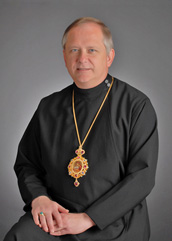 Pope Benedict XVI elected William Charles Skurla, 55, as the 8th bishop (and 5th Archeparch) of the Pittsburgh Ruthenian Church, until now, the Eparch of Passaic (NJ).
Pope Benedict XVI elected William Charles Skurla, 55, as the 8th bishop (and 5th Archeparch) of the Pittsburgh Ruthenian Church, until now, the Eparch of Passaic (NJ).We seem to be asking the same question: What is Christianity? A perplexing question for believers, I suspect. Test everything, Saint Paul tells us. Indeed, probe the question and don't be afraid of doubt and the questions. The certainty of faith is known in the experience and the investigation of the reasonableness of the faith.
Antonio Quaglio in article published today on ilsussidiario.net, "It's Christianity. Simple." reflects on what Father Julián Carrón spoke on at the New Encounter 2012 this past weekend: that Christianity, in its true sense, need to be lived without reservation and without excuses and justifications.
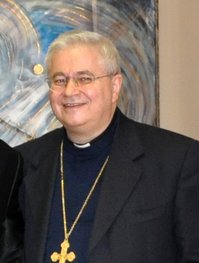
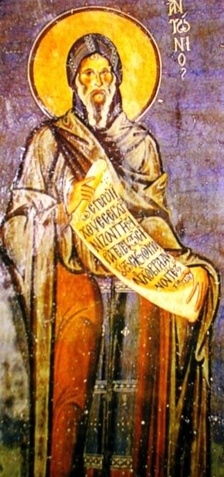
"The challenges we are currently facing are numerous and complex, and can be overcome only if we reinforce our awareness that the destiny of each of us is linked to that of everyone else. For this reason ... acceptance, solidarity and legality are fundamental values. The present crisis can, then, be an opportunity for the entire community to verify whether the values upon which social life is founded have generated a society that is just, fair and united, or whether it is necessary to undertake a profound rethink in order to rediscover values which ... not only favor economic recovery, but which are also attentive to promoting the integral good of human beings."
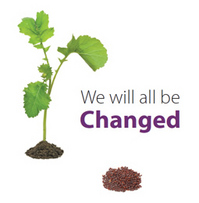 The theme of the '12 Week of Prayer for Christian Unity (18-25 Jan) is taken from Paul's first letter to the Corinthians "We will all be changed by the victory of our Lord Jesus Christ" (15:51-58).
The theme of the '12 Week of Prayer for Christian Unity (18-25 Jan) is taken from Paul's first letter to the Corinthians "We will all be changed by the victory of our Lord Jesus Christ" (15:51-58).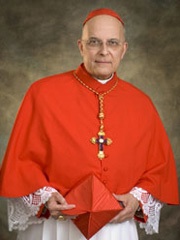 Today is Cardinal Francis Eugene George's 75th birthday. Congrats and continued blessings!!!
Today is Cardinal Francis Eugene George's 75th birthday. Congrats and continued blessings!!!A diocesan bishop who has completed the seventy-fifth year of age is requested to present from office to the Supreme Pontiff, who will make provision after he has examined all the circumstances (401).
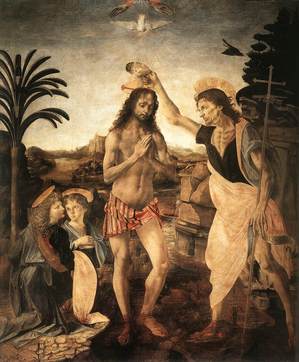 The days following the feasts of the Epiphany (Theophany) and the Baptism of the Lord, the Church focuses her attention on a relationship with the Lord as the Way, the Light and the Truth. The biblical narratives at Mass this week have us praying with the scenes of Christ the healer. With His baptism, Jesus' ministry inaugurated and his light now shines more brightly for us to see the path to salvation.
The days following the feasts of the Epiphany (Theophany) and the Baptism of the Lord, the Church focuses her attention on a relationship with the Lord as the Way, the Light and the Truth. The biblical narratives at Mass this week have us praying with the scenes of Christ the healer. With His baptism, Jesus' ministry inaugurated and his light now shines more brightly for us to see the path to salvation.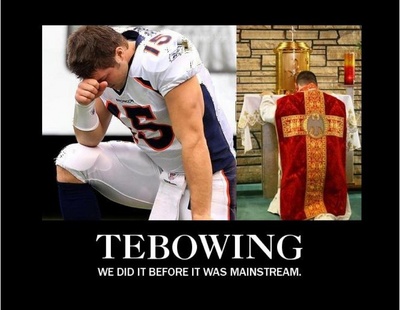
At the new year the Hungarians passed a new constitution with some real changes that will affect the Church and other ecclesial communities, including non-Christian groups. The New York Times ran the article that outlines the changes giving the impression that even the Hungarians are unable to name all the changes. What caught my eye thanks to Brother Richard of OSB.org, when he first posted a note on his FB page that some venerable religious orders like the Benedictines and the Carmelites and a group like the Opus Dei are now downgraded in terms of the law. But why? What does the Hungarian government gain by doing such and what are the long-term implications for the Benedictines and Carmelites? Why weren't the states of the Dominicans and Jesuits changed? Some of what happened is noted here:
"With the new year, as the new constitution goes into effect, all petitions to the [Constitutional] Court lapse and it becomes much harder for anyone to challenge this law -- or any other.
"But it is worth lingering on the newly re-enacted law on the status of churches because it is one of the places where we can clearly see the effects of the new constitutional order on the protection of constitutional rights. What does the law on churches do? It creates 14 state-recognized religions, and decertifies the rest. On January 1, over 300 denominations lose their official status in Hungary -- including their tax exemptions and their abilities to run state-funded schools. While most of the denominations are tiny, many are not. Among the religions that will no longer be able to operate with state approval are all versions of Islam, Buddhism, Hinduism and Baha'i, as well as many smaller Catholic orders including the Benedictines, Marists, Carmelites, and Opus Dei, and a number of major Protestant denominations including Episcopalians, Jehovah's Witnesses, Seventh Day Adventists, Mormons, Methodists, and all but one of the evangelical churches. One each of the orthodox, conservative, and liberal Jewish synagogues are recognized; but all other Jewish congregations are not" (The Unconstitutional Constitution).
A Benedictine from Hungary writes that "religious orders are still part of the Catholic Church in my country and being as such they will maintain their legal status -- all other problematic constitutional points nothwithstanding." (see OSB.org)
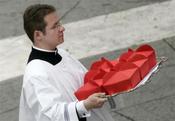 Some segments of the Catholic world are very excited about the Pope's 12th Day of Christmas gift to 22 bishops and priests: being created a cardinal of the Holy Roman Church. The US gets two new cardinals with Archbishops O'Brien and Dolan receiving the papal nod.
Some segments of the Catholic world are very excited about the Pope's 12th Day of Christmas gift to 22 bishops and priests: being created a cardinal of the Holy Roman Church. The US gets two new cardinals with Archbishops O'Brien and Dolan receiving the papal nod. 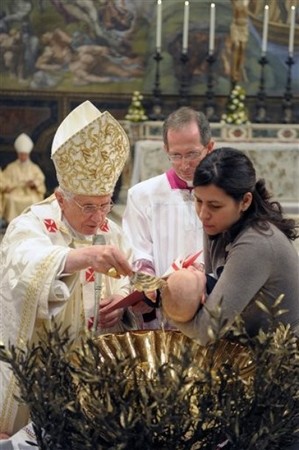 Today the Church in the US celebrates the Feast of the
Baptism of the Lord, in 2012, the day after the Solemnity of the Epiphany. In
other places, like Rome, the Church observed the Baptism of the Lord yesterday
as the Epiphany was celebrated on the traditional 12th day of Christmas,
January 6. Today's feast reminds us that being a Christian is the joy of being
"children of God." During his noontime Angelus Address Pope Benedict said that "God
is the origin of the existence of every creature and the Father in a unique way
of every human being: He has a unique, personal relationship with him or her."
At Mass in Rome earlier in the morning the Pope had baptized 16 newborn infants,
children of Vatican employees in the Sistine Chapel.
Today the Church in the US celebrates the Feast of the
Baptism of the Lord, in 2012, the day after the Solemnity of the Epiphany. In
other places, like Rome, the Church observed the Baptism of the Lord yesterday
as the Epiphany was celebrated on the traditional 12th day of Christmas,
January 6. Today's feast reminds us that being a Christian is the joy of being
"children of God." During his noontime Angelus Address Pope Benedict said that "God
is the origin of the existence of every creature and the Father in a unique way
of every human being: He has a unique, personal relationship with him or her."
At Mass in Rome earlier in the morning the Pope had baptized 16 newborn infants,
children of Vatican employees in the Sistine Chapel.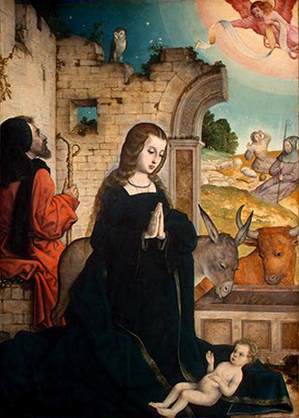
Have we finished the Christmas season in good order? Have we exceeded our expectation to live the season of Christmas differently from what secular culture has given us? Or, have we given up and just given ourselves over to the mediocrity of the the world around us with regard to Christian Faith? What follows is a very interesting commentary on our Christian observance of the Birth of Jesus, the Nativity of God-Man by Father Julián Carrón. While the today brings to a close the Church's yearly observance of Christmastide, we have work to do before we put to rest the nagging questions: what difference does this Child make in my life? AND Do we really believe that God is in our midst?
In order to describe our humanity and to see ourselves properly at this moment in the world's history, it is hard for us to find more appropriate words than those contained in this passage by the Prophet Zephaniah. "Sing aloud, O daughter of Zion; shout, O Israel!". Why? What reason is there to rejoice, with all that is happening in the world? Because "the Lord has taken away the judgments against you".
The first repercussion that these words produced in me was surprise at how the Lord looks at us: with a gaze that succeeds in seeing things that we shall not be able to recognize unless we participate in his same gaze at reality. "The Lord has taken away the judgments against you": in other words, your evil does not have the last word over your life; the usual way you look at yourself is not the right one; the look with which you constantly reproach yourself is not true. The one true look is the Lord's look. And it is precisely by this look that you will be able to understand that he is with you: if he has taken away the judgment against you, what can you fear? "You shall fear evil no more". An inexorable positiveness prevails over life. For this reason, the biblical passage continues, "do not fear, O Zion, do not let your hands grow weak" Why? Because "The Lord your God is in your midst, a warrior who gives victory". There is no other source of joy than this: "he will rejoice over you with gladness. He will renew you with his love, he will exult over you with loud singing" (3:14-17).
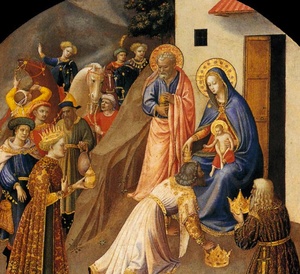
We celebrate a holy day adorned with three mysteries: this day the star led the Magi to the manger; this day wine was made from water at the wedding; this day Christ willed to be baptized in the Jordan by John in order to save us, alleluia. (Antiphon for the Magnificat, Second Vespers)
The Church prays
O God, who on this day revealed your Only Begotten Son to the nations by the guidance of a star, grant in your mercy that we who know you already by faith, may be brought to behold the beauty of your sublime glory.
The Magi give us an example to follow: to walk diligently, to walk by faith guided by the indications of God --that is, the star-- in order to arrive at what God wants to give. Himself. As Pope Benedict said on Friday, the Magi are the best example of "humanity's pilgrimage to Jesus." The giving of the gifts of gold, frankincense and myrrh is merely the beginning of our gift to the Lord. Our gift is none other than ourselves, as freely as it is possible to give...
Our first point on the pilgrimage is what is sung in the "The First Nowell," Then entered in there Wise Men three, Full reverently on bended knee....
By walking this pilgrimage to Jesus, the Magi arrive at Truth itself. Do we have the courage to do the same or do we succumb to human opinion?
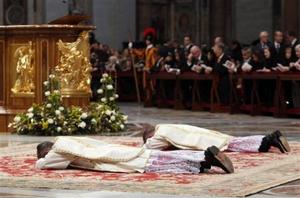 ... how can we fail to recognize in all this certain essential elements of episcopal ministry? The bishop too must be a man of restless heart, not satisfied with the ordinary things of this world, but inwardly driven by his heart's unrest to draw ever closer to God, to seek his face, to recognize him more and more, to be able to love him more and more. The bishop too must be a man of watchful heart, who recognizes the gentle language of God and understands how to distinguish truth from mere appearance. The bishop too must be filled with the courage of humility, not asking what prevailing opinion says about him, but following the criterion of God's truth and taking his stand accordingly - "opportune - importune". He must be able to go ahead and mark out the path. He must go ahead, in the footsteps of him who went ahead of us all because he is the true shepherd, the true star of the promise: Jesus Christ. And he must have the humility to bend down before the God who made himself so tangible and so simple that he contradicts our foolish pride in its reluctance to see God so close and so small. He must devote his life to adoration of the incarnate Son of God, which constantly points him towards the path.
... how can we fail to recognize in all this certain essential elements of episcopal ministry? The bishop too must be a man of restless heart, not satisfied with the ordinary things of this world, but inwardly driven by his heart's unrest to draw ever closer to God, to seek his face, to recognize him more and more, to be able to love him more and more. The bishop too must be a man of watchful heart, who recognizes the gentle language of God and understands how to distinguish truth from mere appearance. The bishop too must be filled with the courage of humility, not asking what prevailing opinion says about him, but following the criterion of God's truth and taking his stand accordingly - "opportune - importune". He must be able to go ahead and mark out the path. He must go ahead, in the footsteps of him who went ahead of us all because he is the true shepherd, the true star of the promise: Jesus Christ. And he must have the humility to bend down before the God who made himself so tangible and so simple that he contradicts our foolish pride in its reluctance to see God so close and so small. He must devote his life to adoration of the incarnate Son of God, which constantly points him towards the path.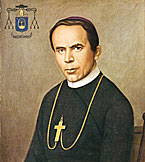 The famed American bishop, John Neumann (1811-60), is recalled by the Church today in her Liturgy. Known for his zeal and charity, John Neumann was an immigrant from Bohemia to North America and where he worked diligently to proclaim the Good News of Jesus Christ. Neumann was famous for his work with the poor, Catholic education and the Eucharistic adoration. The readings from Scripture and the Collects from the Mass all conspire to remind us of the urgent and real concern we ought to have for our brothers and sisters. The Collect even as a reference to the city where the saint was bishop, Philadelphia.
The famed American bishop, John Neumann (1811-60), is recalled by the Church today in her Liturgy. Known for his zeal and charity, John Neumann was an immigrant from Bohemia to North America and where he worked diligently to proclaim the Good News of Jesus Christ. Neumann was famous for his work with the poor, Catholic education and the Eucharistic adoration. The readings from Scripture and the Collects from the Mass all conspire to remind us of the urgent and real concern we ought to have for our brothers and sisters. The Collect even as a reference to the city where the saint was bishop, Philadelphia. 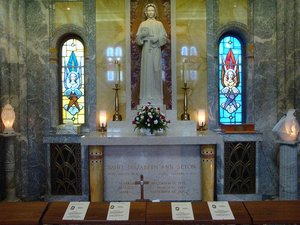 The first United States native to be canonized by the Catholic Church is Elizabeth Ann Seton (August 28, 1774 - January 4, 1821). She is the famous American convert, wife, mother and founder of a religious congregation of women (The Sisters of Charity) revolutionized the work of the Church in the US. Seton's motto, "Hazard yet forward" is a indication of her deep conviction that Christ indeed is our Savior and everything we do ought to be done for Him. Our "hazard" is being bold in proclaiming the Good News of Salvation, in proposing to live this Good News so that our lives are truly different and all people may see the face of Christ in our own.
The first United States native to be canonized by the Catholic Church is Elizabeth Ann Seton (August 28, 1774 - January 4, 1821). She is the famous American convert, wife, mother and founder of a religious congregation of women (The Sisters of Charity) revolutionized the work of the Church in the US. Seton's motto, "Hazard yet forward" is a indication of her deep conviction that Christ indeed is our Savior and everything we do ought to be done for Him. Our "hazard" is being bold in proclaiming the Good News of Salvation, in proposing to live this Good News so that our lives are truly different and all people may see the face of Christ in our own.
Image via Wikipedia
